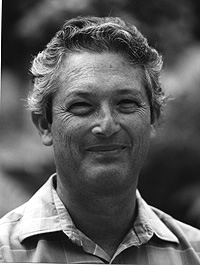Physicist Stanley Flatté, whose work on wave propagation led to important contributions in the fields of atmospheric optics, ocean acoustics, and seismology, died on Sunday, November 4, at his home in Santa Cruz. He was 66.
Flatté, a professor emeritus of physics at the University of California, Santa Cruz, had been ill for many years, but had maintained an active research program and continued to work on campus after his retirement in 2004. His numerous interdisciplinary collaborations grew out of his interest in numerical simulation of waves propagating through random media. He also made significant contributions to basic research in particle physics.
"He was almost unique on campus, not only in the number of areas in which he was involved, but also the level of recognition for his contributions in different areas," said Abraham Seiden, director of the Santa Cruz Institute for Particle Physics (SCIPP) at UCSC. "He worked with a large number of different people on campus, and in recent years he did more in ocean sciences and Earth sciences than in physics itself."
Flatté earned a B.S. in physics at the California Institute of Technology and a Ph.D. in physics at UC Berkeley. He worked as a research physicist at Lawrence Berkeley Laboratory for five years before joining the UCSC faculty in 1971. At UCSC, he was affiliated with both SCIPP and the Institute of Marine Sciences. Flatté also served as a member of JASON, a national scientific advisory group to many government agencies.
As an indication of the diversity of his interests and contributions, Flatté was a fellow of the American Physical Society, the Acoustical Society of America, the Optical Society of America, and the American Association for the Advancement of Science. In the area of particle physics, the Flatté Parametrization he developed is still used to describe the decay of certain kinds of mesons (fundamental particles made of quarks and antiquarks).
Flatté's work on ocean acoustics began in the mid-1970s and continued for more than two decades. He helped develop a new paradigm in understanding sound transmission in the ocean. In the 1990s, he was involved in the Acoustic Thermometry of Ocean Climate (ATOC) experiment, which aimed to track the average temperature of the ocean using sound waves.
In the area of atmospheric optics, Flatté studied the propagation of light waves through atmospheric turbulence. This work led to a collaboration with Claire Max, a pioneer in the field of adaptive optics for telescopes and now director of the Center for Adaptive Optics at UCSC and a professor of astronomy and astrophysics.
In seismology, Flatté contributed to research on the scattering of seismic waves in the deep Earth. Geophysicist Ru-Shan Wu came to UCSC in 1986 to work with Flatté on scattering theory. Thorne Lay, professor of Earth and planetary sciences, said this collaboration led to the development by Wu of important techniques used by the oil exploration industry.
"His collaboration with Ru-Shan Wu led to a major research program here at UCSC," Lay said. "It exemplifies the cross-disciplinary opportunities that characterize UC Santa Cruz. Flatté helped establish strong interdisciplinary connections that have been a major advantage of our campus."
Flatté is survived by his wife of 41 years, Renelde, of Santa Cruz; their son Michael of Iowa City and daughter Anne of San Francisco; his mother Henrietta Flatté of Los Angeles; and six grandchildren.
A memorial service will be held on Sunday, November 11, at 2 p.m. at Temple Beth El, 3055 Porter Gulch Road, in Aptos.



